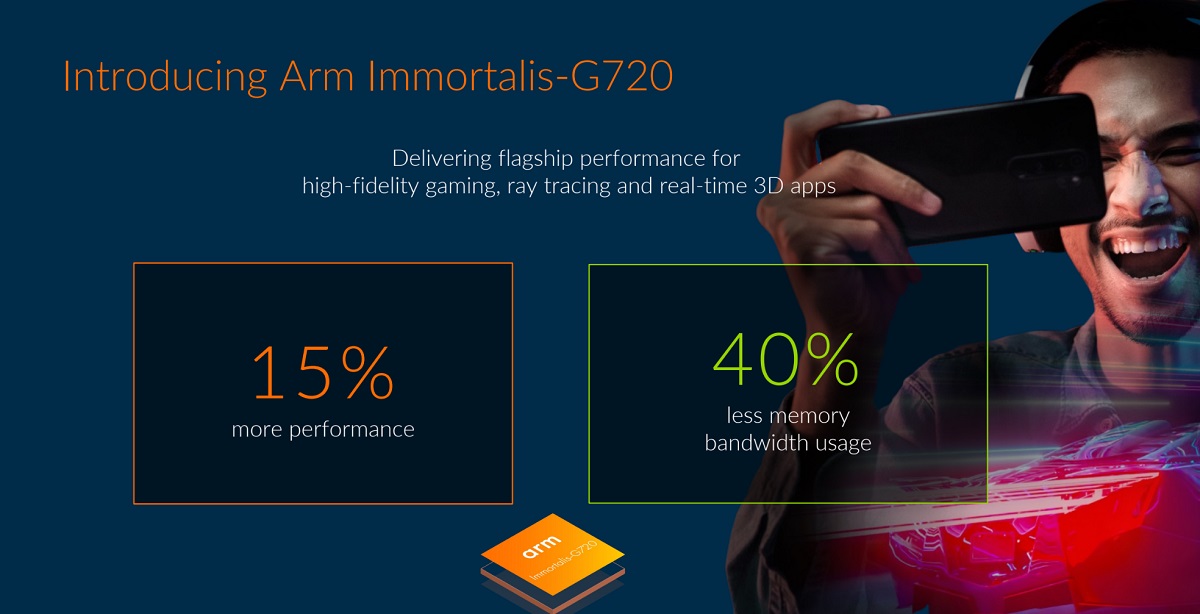Arm has introduced its 5th-generation graphics processing unit (GPU) architecture, beginning with its Arm Immortalis-G720. The company revealed this at the Computex trade show in Taiwan, along with its Armv9 Cortex compute cluster, which has delivered double-digit performance gains for three consecutive years. In addition, Arm has launched its TCS23 platform for premium mobile computing. The platform is designed to power immersive games, real-time 3D experiences, and next-gen AI apps. Arm believes that mobile devices are central to our digital lives as they allow users to create and consume increasingly immersive, AI-accelerated experiences.
Efficient GPU Architecture
Arm’s latest GPU architecture is designed to be the most efficient architecture the company has ever created. The 5th Gen architecture has redefined parts of the graphics pipeline to reduce memory bandwidth, enabling the next generation of high geometry games and real-time 3D applications. This new architecture is also bringing smoother gameplay and complex PC and console-like experiences to mobile. Arm’s DVS (Deferred Vertex Shading) is a new graphics feature introduced in the 5th Gen GPU architecture that redefines the dataflow, enabling partners to scale for larger core counts and higher performance points. Popular games like Genshin Impact and Fortnite are already benefiting from DVS.
Arm’s TCS23 includes the Arm Immortalis GPU based on Arm’s brand-new 5th Generation GPU architecture for ultimate visual experiences. The new Immortalis-G720 is Arm’s most performant and efficient GPU ever, delivering 15 percent performance and efficiency improvements over the previous generation. Alongside the Immortalis-G720, Arm has added to its portfolio of GPUs with the new Arm Mali-G720 and Mali-G620. These new Mali GPUs are designed to bring premium graphics features to a wider market of consumer devices more quickly.
Arm Cortex Compute Cluster
Arm’s TCS23 delivers a complete package of the latest intellectual property designed and optimized for specific workloads to work seamlessly together as a complete system. The new Armv9 Cortex CPU compute cluster is a vital part of this high-performance cluster. It delivers double-digit performance gains and significant efficiency improvements for the third consecutive year. The new Arm Cortex-X4, which is a fourth-generation Cortex-X core, pushes the limit of performance on flagship smartphones. It is the fastest CPU that Arm has ever built, bringing 15% more performance compared to the Cortex-X3. The new power-efficient microarchitecture consumes 40% less power than Cortex-X3 on the same process, bringing the on-device experiences, like UI responsiveness and application launch time, to the next level and enabling next-gen AI and ML-based applications.
Arm’s CPU performance leadership extends to Arm’s new big and LITTLE cores – the Arm Cortex-A720 and Cortex-A520. Cortex-A720 is a CPU IP that boosts sustained performance as the workhorse of the cluster. Meanwhile, Cortex-A520 is Arm’s most performant high-efficiency CPU core ever. These new CPU designs bring the power efficiency improvements of up to 20% over previous generations, benefitting use cases like AAA gaming, all-day productivity, and background tasks.
Arm is focusing on tighter coupling on process nodes and compute capabilities and has partnered with TSMC to tap out the Cortex-X4 on the TSMC N3E process – an industry first. Arm is committed to smartphone performance and will invest heavily in key IP, such as the Krake GPU and the Blackhawk CPU, to deliver the compute and graphics performance its partners demand. Arm’s partners include Asus, Android, Honor, Intel Foundry Services, Mediatek, Oppo, Samsung, Tencent Games, TSMC, Unity, Xiaomi, and Vivo. The company’s CPU and GPU roadmap will demonstrate its continued commitment to smartphone performance.


Leave a Reply